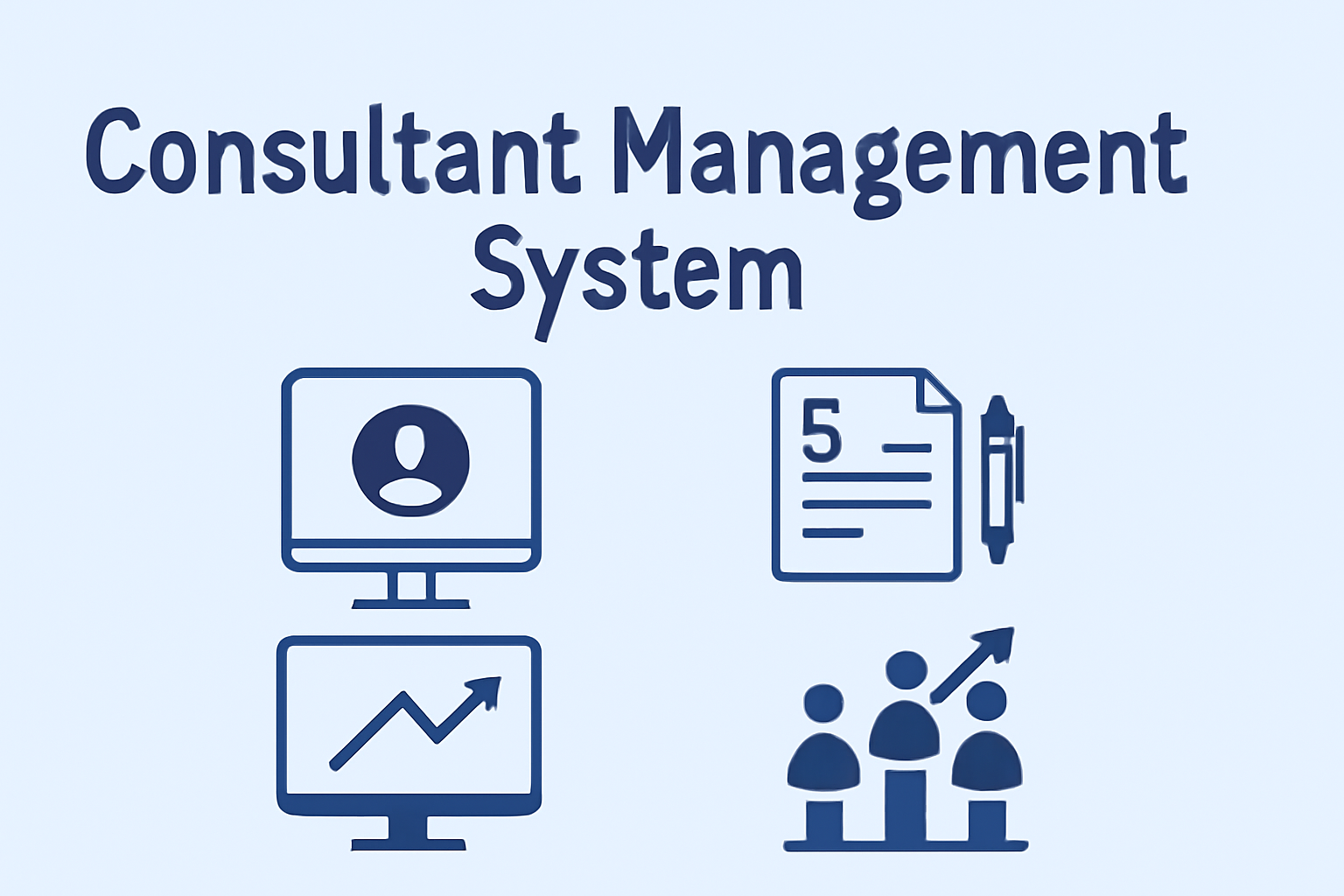Consultant Management System: Revolutionizing the Future of Consulting and Talent Management
Streamlining Consultant Operations and Enhancing Project Efficiency

The consultant management system (CMS) is transforming the way businesses manage their external consulting workforce. With the rise of a global talent pool and the increasing complexity of modern business operations, a robust CMS provides the necessary tools to streamline processes such as recruitment, contract management, performance tracking, and client relationship management. This article will explore the key elements of a CMS, its core benefits, features, and how it can shape the future of consulting businesses.
What is a Consultant Management System?
A Consultant Management System (CMS) is a software solution designed to streamline and automate the entire lifecycle of consultant engagements. From onboarding consultants to contract management, performance tracking, invoicing, and compliance monitoring, a CMS integrates various tools to simplify the management of consulting relationships.
Consulting firms, as well as companies that frequently use external consultants, rely on CMS to efficiently manage their talent pool and deliver services. It centralizes consultant information and performance data, making it easy to track each consultant’s contributions and streamline decision-making processes.
Key Features of a Consultant Management System
A CMS offers several features that cater to different aspects of consultant management. These features are crucial for firms looking to maintain smooth operations and ensure effective project execution.
1. Consultant Onboarding
The first step in consultant management is ensuring that the right talent is brought on board. A CMS automates the consultant onboarding process by allowing companies to collect necessary documents, verify credentials, and set up profiles in a centralized database. This helps reduce administrative burdens and accelerates the onboarding process, ensuring that consultants can quickly start contributing to projects.
2. Contract Lifecycle Management
Managing contracts can be a complex task, especially when dealing with multiple consultants across various projects. A CMS automates the contract lifecycle, including creation, modification, approval, and renewal. This feature ensures that contracts are always up-to-date and compliant with legal requirements, minimizing the risk of disputes.
3. Performance Tracking
Performance tracking is essential for evaluating the success of consultants on projects. CMS platforms provide tools to monitor consultant performance, assess deliverables, and track key performance indicators (KPIs). This feature allows businesses to provide timely feedback and ensure that consultants meet expectations, which helps improve future performance.
4. Time & Expense Management
Time tracking and expense management are vital components of consulting engagements. A CMS allows consultants to log their hours, track their expenses, and submit reports, which can then be approved or rejected by managers. This feature helps prevent billing errors and ensures that consultants are compensated fairly for their work.
5. Billing & Invoicing
An effective CMS integrates billing and invoicing features to ensure accurate payments to consultants. By automating invoicing based on time and expenses, the system helps eliminate errors and speeds up the payment process. This also improves cash flow management, as businesses can track outstanding invoices and overdue payments.
Why Is Consultant Management Important?
Consulting is an integral part of many industries, offering expertise across a wide range of fields. Managing consultants effectively ensures that firms can leverage their external talent for maximum impact.
1. Resource Allocation
A CMS helps businesses allocate resources efficiently by ensuring that the right consultant is assigned to the right project. With real-time access to consultant profiles, availability, and expertise, companies can quickly assign tasks, ensuring that projects are completed on time and within budget.
2. Skills Matching
One of the most important aspects of consultant management is matching the right talent to the right project. A CMS stores data about each consultant’s skills, certifications, experience, and past performance, making it easier to match consultants with projects that require their expertise. This improves the overall quality of service provided to clients.
3. Compliance Monitoring
Consultants often work in highly regulated industries, where compliance with legal and contractual requirements is critical. A CMS helps monitor compliance by tracking contract terms, ensuring that all documents and procedures align with industry standards. This reduces the risk of non-compliance and associated penalties.
Core Benefits of Using a Consultant Management System
The implementation of a CMS offers several benefits to consulting firms and businesses that rely on consultants for specialized tasks.
1. Improved Efficiency
By automating routine administrative tasks such as document collection, contract management, time tracking, and invoicing, a CMS frees up time for businesses to focus on core operations. This improved efficiency leads to faster project execution, reduced errors, and a better experience for both clients and consultants.
2. Data-Driven Decision Making
A CMS provides businesses with valuable insights into consultant performance, project progress, and financials. By utilizing these data points, firms can make informed decisions about resource allocation, project timelines, and consultant selection, leading to better outcomes for both the firm and its clients.
3. Scalability
As businesses grow and take on more consulting projects, the need for an efficient system to manage consultants becomes even more critical. A CMS offers scalability, allowing firms to manage an expanding workforce without overwhelming administrative systems. This scalability ensures that businesses can maintain high-quality service as they scale.
Consultant Management System for Different Industries
A CMS is not just limited to consulting firms; it is used across various industries to manage external talent.
1. Management Consulting
Management consulting firms rely on CMS to oversee consultant activities, ensuring that strategic recommendations align with client goals. By tracking performance and ensuring compliance with project timelines, a CMS helps management consultants deliver consistent, high-quality services to clients.
2. Technology Consulting Firms
Technology consulting firms use CMS to manage IT consultants, track project deliverables, and ensure that projects meet technical specifications. This helps businesses deliver technology solutions on time and within budget, providing clients with innovative solutions that meet their needs.
3. HR Consting Firms
HR consulting firms use CMS to manage external HR experts who assist with recruitment, training, and organizational development. By managing consultant data and performance, HR firms can ensure that consultants contribute effectively to client organizations.
Frequently Asked Questions (FAQ)
What is the pulrimary purpose of a Consultant Management System?
The primary purpose of a CMS is to streamline the management of consultants by automating tasks such as recruitment, contract management, performance tracking, and billing.
How does a CMS help with compliance?
A CMS helps monitor compliance by ensuring that contracts are up to date, that legal requirements are met, and that consultants adhere to project timelines and deliverables.
What industries benefit from Consultant Management Systems?
Industries that rely on external consultants, such as management consulting, technology consulting, HR consulting, and financial consulting, benefit from CMS systems.
Can a CMS help with resource allocation?
Yes, a CMS assists with resource allocation by providing real-time data on consultant availability, skills, and performance, helping businesses assign the right consultant to the right project.
Conclusion
The Consultant Management System is an essential tool for businesses that rely on consultants. With its wide array of features, from consultant onboarding and contract management to performance tracking and billing, a CMS ensures that consulting engagements are managed effectively and efficiently. By leveraging these systems, firms can improve operational efficiency, make data-driven decisions, and ensure compliance, ultimately leading to better project outcomes and satisfied clients.
Incorporating a CMS into your consulting business can drive significant improvements in both internal processes and client relationships, creating a foundation for long-term success.


